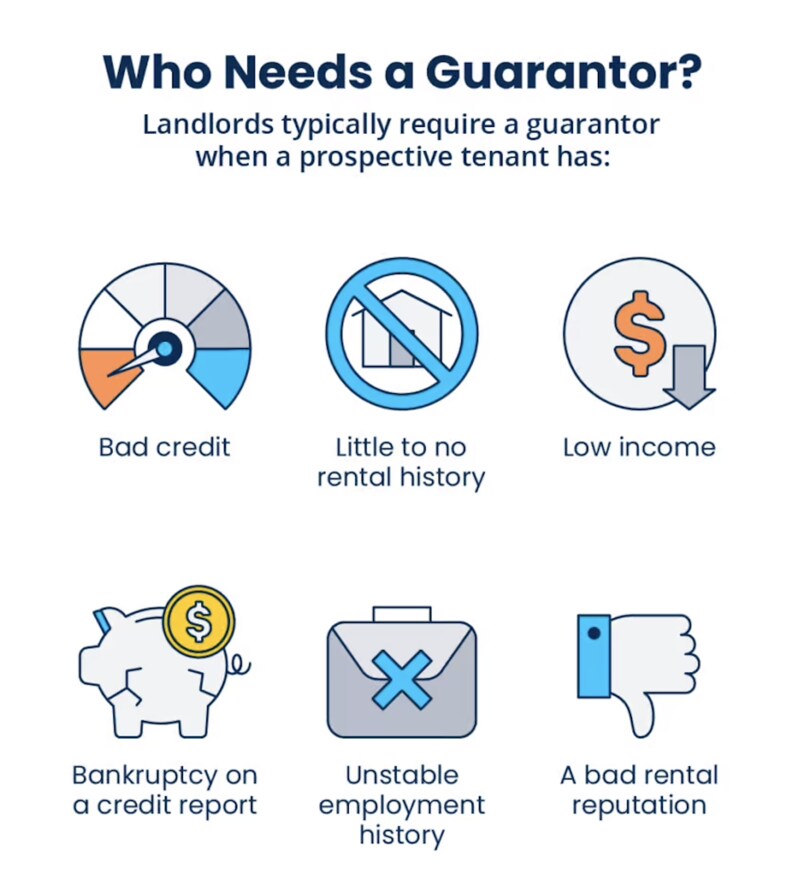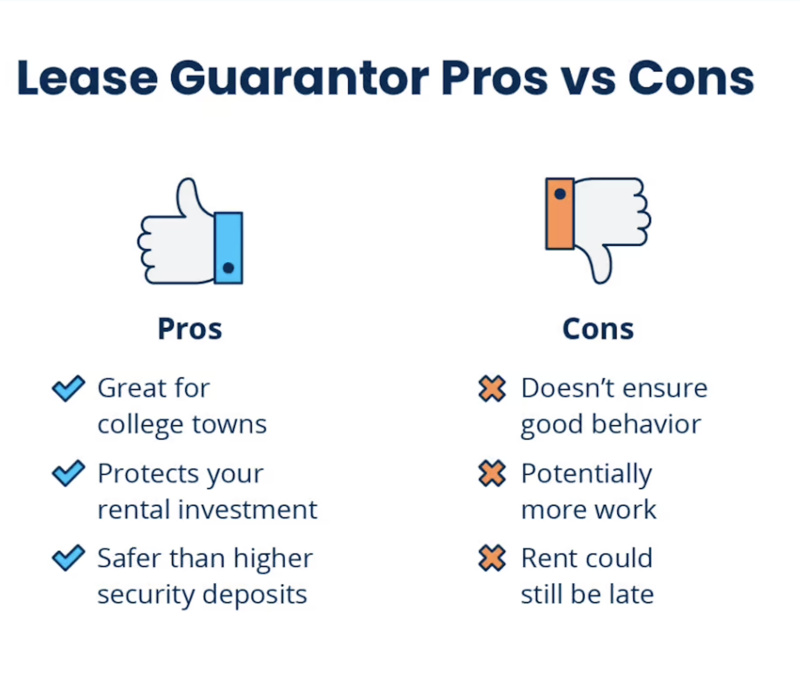A guarantor has a key part in many money arrangements. They give confidence to the person lending money or renting property that another party will repay their loan or complete lease duties. We'll look into what being a guarantor means, go over the jobs they have, and offer examples to show how important they are in different financial situations.
Definition of a Guarantor
A guarantor is a person or group that promises to be responsible for the debt, lease, or contract commitments of someone else in case they fail to fulfill them. When a person acts as a guarantor, they are offering their possessions or ability to get credit so that it's guaranteed the lender or landlord will receive what's promised. Often, there's a need for a guarantor when the main borrower/tenant doesn't have a good credit past and also income enough to be eligible for a loan/lease.

Furthermore, besides offering protection for financial needs, guarantors can help in making possible deals that the borrower or tenant would not get without them. Their participation might fill up the difference between what applicants have and what lenders or landlords need for approving their request; this could create chances that could have remained out of reach otherwise.
- Legal Protection: Guarantors should ensure that the terms of the guarantee are legally sound and clearly outlined to avoid misunderstandings or disputes later on.
- Regular Review: It's advisable for guarantors to periodically review the status of the loan or lease agreement to stay informed about any changes or developments that may affect their obligations.
Key Responsibilities of a Guarantor
The main duty of a guarantor is to carry out the duties of the person who borrowed money or rented a place, in case they don't keep up with their obligations. This involves paying back loans, handling lease costs, or clearing any unpaid debts as stated by the contract. Guarantors must fully comprehend and accept the terms and rules set in the agreement they are guaranteeing. They need to be ready to take action if the borrower or tenant fails to meet their responsibilities as agreed upon. Additionally, guarantors may need to provide financial documentation or collateral to secure the guarantee.
Guarantors, too, need to keep a line of clear conversation with the borrower or tenant all along the agreement. This makes sure that any alterations in situations that might impact the borrower's capability to fulfill their duties are visible and permits action if required.
- Documentation Preparation: Guarantors must ensure that all required documentation, such as financial statements or credit reports, is accurate and up-to-date to avoid delays or complications during the application process.
- Financial Planning: It's prudent for guarantors to assess their financial situation and obligations before agreeing to guarantee a loan or lease, ensuring they have the means to fulfill their responsibilities if required.
Examples of Guarantors in Action
For a clearer understanding on the part of a guarantor, think about these instances. In the lending area, usually, parents are guarantors for loans that their children take as students particularly when they have less credit history or income. For tenants who don't meet the required income or have bad credit, landlords might ask for a guarantee from someone else. Also, small business owners might require a guarantor to obtain a business loan when their company does not have established credit or enough collateral to serve as security.
Guarantor arrangements are not only seen in personal relationships but also common in professional situations. A good example could be when an investor needs a guarantor to get finance for a project like real estate development, reducing risk linked with that plan and giving confidence to lenders.
- Risk Assessment: Before agreeing to serve as a guarantor, individuals should conduct a thorough risk assessment, considering factors such as the borrower's financial stability, the purpose of the loan or lease, and the potential consequences of default.
- Legal Consultation: In complex or high-value transactions, seeking legal advice can help guarantors understand their rights and obligations under the guarantee agreement.
Legal Implications and Risks for Guarantors
Making sure of another person's debt or responsibilities means you might face legal and money-related dangers. If the borrower doesn't meet their obligations, like paying back all money owed with any interest or penalties added on top, then the guarantor could become responsible for the total amount due. Not keeping a promise to pay can result in legal actions, harm credit ratings and possibly taking away possessions. It is very important for guarantors to carefully consider their financial capacity and the trustworthiness of the borrower before accepting to guarantee a loan or lease.

Guarantors, besides legal matters, must think about how this might affect their relationships with family or business associates. Any disagreements that come up from guarantee agreements could create tension among those involved and underline the significance of open communication and shared comprehension between all parties concerned.
- Credit Monitoring: Guarantors should regularly monitor their credit reports to detect any discrepancies or unauthorized activity that may arise as a result of the guarantee arrangement.
- Exit Strategy: Guarantors should establish an exit strategy in case the borrower's circumstances change unexpectedly, allowing for a smooth transition out of the guarantee agreement if necessary.
How to Minimize Risks as a Guarantor?
When helping friends or family members with their financing needs, it's important to understand that being a guarantor can be useful. However, you must also manage the possible risks involved. Before you agree to guarantee a loan or lease, look into the conditions of the agreement and evaluate how capable the borrower is in fulfilling their duties. You may want to think about putting some restrictions on your guarantee like specifying a certain dollar amount or period. Furthermore, keep a frequent conversation with the borrower to be aware of their money conditions and handle any anxieties quickly.
Moreover, guarantors might look at possibilities for extra safety. They could consider getting insurance or discussing clauses that restrict their responsibility in specific situations. These actions can give more assurance and protect against unexpected difficulties.
- Professional Advice: Seeking advice from financial advisors or legal experts can provide valuable insights into the potential risks and strategies for mitigating them.
- Emergency Fund: Maintaining an emergency fund separate from personal finances can provide a buffer in case the guarantor needs to fulfill their obligations unexpectedly.
Alternatives to Guarantor Arrangements
In times when it's not possible or wanted to find a guarantor, there are other choices too. Those who need money, can try to improve their credit score, increase how much they earn, or give something valuable as collateral. This could make them more likely to get a loan without needing someone else's guarantee. Some loan providers have special types of loans made for people who have little history with credit or income situations. In the same way, renters can look for rental help projects or talk with landlords to deal with lease conditions without needing a guarantor.
Moreover, those taking out loans might think about getting a loan with a co-signer instead of a guarantor. Unlike guarantors, co-signers are equally accountable for the debt right from the beginning and have joint liability and stake in the obligation. This setup may divide the risk more evenly among numerous parties while still giving lenders or landlords the required guarantee.
- Credit Building: Taking proactive steps to improve creditworthiness can expand borrowing options and reduce reliance on guarantors or co-signers.
- Tenant Rights: Tenants should familiarize themselves with local rental laws and regulations to ensure they understand their rights and responsibilities independent of a guarantor's involvement.
Conclusion
To wrap it up, knowing what a guarantor does is very important if you are thinking about making a financial deal that needs extra assurance. It doesn't matter if you're the person who guarantees or the one looking for a guarantee, knowing responsibilities, dangers, and other options can assist in making wise choices and protecting your money-related interests.

What You Need to Know About Nonrefundable Tax Credits

Why Home Sales Hit Roadblocks: Unraveling 5 Key Challenges

Reasons Why a Driver's License Might Be Revoked

Are You Eligible to Take Advantage of the IRA Deduction?

Navigating the Complexity of Form 6251: Alternative Minimum Tax-Individuals

Understanding the 2024 Workforce Turmoil: Companies Laying Off Thousands of Workers

Demystifying Accounting Methods: A Simplified Guide

7 Effective Strategies for Teaching Your Kids Financial Literacy

How to Calculate the Amortization of Intangible Assets: A Guide?

What Are Money Market Funds? A Complete Guide

Unlocking Savings: A Step-by-Step Guide to Balance Transfers with Your PNC Credit Card
